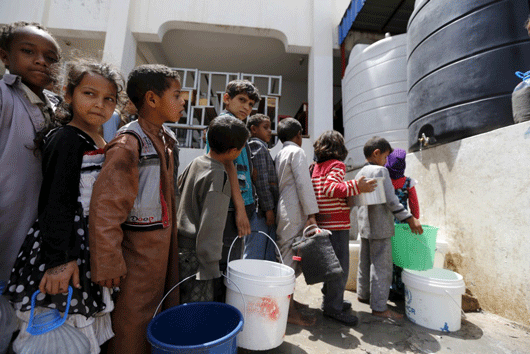
By Larisa Epatko
Fighting in Yemen after revolutionaries...overthrew the government in early 2015 has created a dire humanitarian situation unparalleled even in places as battle-scarred as Syria, according to a Doctors Without Borders worker.
"I’ve worked in war zones for the past 11 to 12 years, in some of the worst conflicts like Syria, but I have never seen such destruction conducted in such a short period as in Yemen," wrote Michael Seawright from Auckland, New Zealand.
Seawright served as project coordinator for Doctors Without Borders in the Middle Eastern region. "I was based in Saada, in the north, in a Houthi-controlled area that was experiencing almost daily attacks from coalition air forces. These airstrikes were often close to our facilities and we clearly felt their effects," he wrote.
Saudi Arabia, Yemen’s neighbor to the north, began airstrikes in March 2015 in order to keep the ... Houthi revolutionaries... away from its border. But the airstrikes in ... Houthi-held... areas have had a devastating effect on the population and on humanitarian efforts over the past year, according to aid groups.
Seawright’s account, originally published on the Doctors Without Border website, describes operations at the 93-bed hospital in Saada City.
"We were receiving a lot of patients with severe injuries, including traumatic amputations - people would come in missing feet, hands and with severe abdominal and head trauma. Many of the wounded had traveled from four to five hours away, given that it was the only hospital with emergency surgical capacity in the province, in fact in most of northern Yemen.
"There were lots of patients: we were seeing over 2,000 emergency cases a month and more than 100 surgeries a week. If you combine that with the security situation keeping people awake, it was quite challenging, especially for our medical staff many of whom were on call 24-hours a day due to staff shortages across the country.
"Despite the volatility of the conflict, life goes on, and as always pregnant women need somewhere safe to deliver their babies. The maternity ward, supported by MSF, delivered over 100 babies a week in the hospital. This was a source of pride for them but also reassuring for the wider population to know that while lives were being lost new life was being created.
"One patient whose story was particularly moving was a 3-year-old boy with severe burns who came in to the emergency department in Saada with his uncle and father. The family lived near the Saudi border, in an area where there were regular indiscriminate attacks against the community.
This month, a Doctors Without Borders-supported hospital set up near the Saudi border to try to cut down on travel time to the Saada facility was struck by a military projectile and collapsed, killing six people.